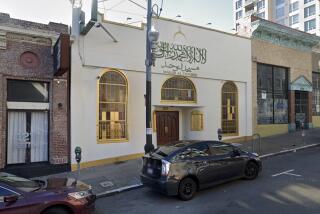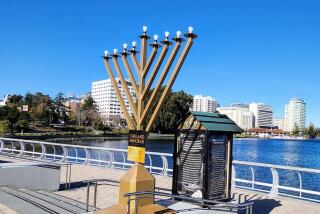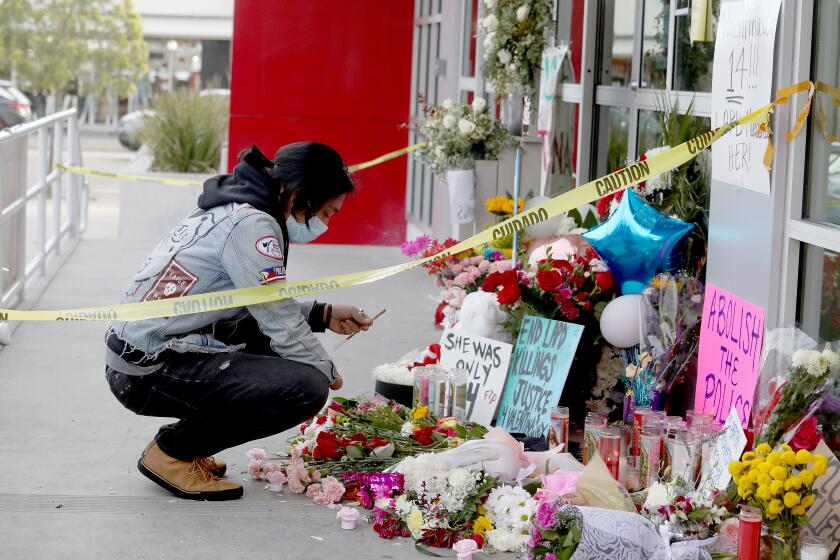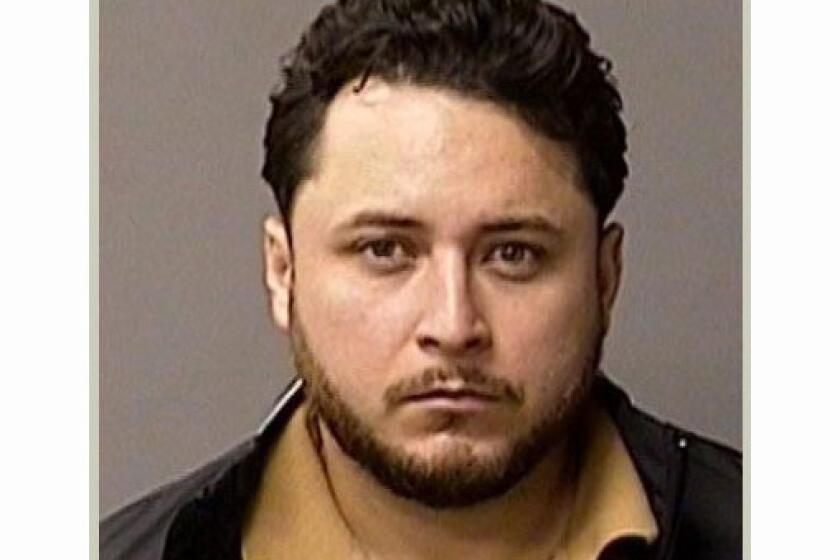Attack on Sikh men triggers outcry in Elk Grove, Calif., and beyond
Orange police chalk marks the lonely stretch of roadway where the crime occurred.
Surinder Singh, 65, and Gurmej Atwal, 78, were out on their customary afternoon stroll in this suburb south of Sacramento when they were shot near the bright green bus shelter overlooking California 99, where they often stopped to rest. Singh died at the scene. Atwal remains in critical condition.
No arrests have been made and no motive established in last month’s shooting of the elderly Sikh neighbors, which has triggered a national outcry.
Police have not ruled out the possibility of a hate crime. It is a scenario that has played out numerous times since Sept. 11, 2001 — Sikhs mistaken for Muslims and randomly attacked.
FOR THE RECORD:
Sikhs attacked: An April 11 article in Section A about the shooting of two elderly Sikh neighbors in Elk Grove, Calif., last month said a cab driver who is also Sikh and who was beaten in November is from Elk Grove. The story failed to mention that the beating occurred in West Sacramento. Also, a caption with a photo of Bhagat Singh, 7, attending a memorial to honor the shooting victims, Surinder Singh and Gurmej Atwal, stated that the boy is the grandson of Surinder Singh. Bhagat Singh is Atwal’s grandson. Also, an earlier version of this article included a headline that said two Sikh men were killed in an attack in Elk Grove, Calif. One man was killed in the attack, another was wounded.—
Days after 9/11, a Sikh gas station owner was shot to death in Arizona by a man who claimed to be “a patriot.” Since then, numerous other attacks have been reported across the country.
In November, an Elk Grove cab driver, who is also Sikh, was beaten by two men who yelled anti-Muslim slurs. Two suspects were later arrested.
This time, local and state officials and emissaries of different faiths reacted swiftly.
“What occurred in our community last month is sickening,” said state Sen. Darryl Steinberg (D-Sacramento), who has helped organize an American Sikh Day celebration on the Capitol steps Wednesday to honor California’s 200,000 Sikhs. “There is only one response to be had. That is you speak up and you come together.”
Steinberg also plans a ceremony on the Senate floor Monday to acknowledge the shooting victims.
The FBI is assisting Elk Grove police, who immediately sought to allay the fears of the town’s 3,000 Sikhs and increased patrols where elders often stroll. Many, like Singh and Atwal, wear turbans over their uncut hair to signify Sikh devotion to religious faith and belief in generosity to strangers.
A $50,000 reward for information in the case has also been established, with contributions from Muslim, Jewish, Hindu and Japanese American groups, and Elk Grove FIRST, whose stated vision is “the promotion of ideas that elevates community above self.”
Floyd Mori, national director of the Japanese American Citizens League, flew from Washington, D.C., to attend Singh’s funeral. His organization has noted similarities in the reactions to Pearl Harbor and 9/11: “A particular group of people was accused of being disloyal and unpatriotic simply because of their religion or their ethnicity.
“We have stood up very strongly in support of the Muslim and Sikh community since that time,” he said. “We need to get beyond this whole thing of how we stereotype people into good and evil. We need to start being civil.”
In the same spirit, the stark white Sikh Temple of Sacramento, with its cobalt blue-tipped domes and saffron flag, has become a center of community gatherings to support the victims’ families and prepare for Wednesday’s event.
“We’ve gotten so much sympathy, so many emails,” said Darshan Singh Mundy, the temple’s spokesman. “The majority say, ‘You are bringing the community together.’ ”
The world’s fifth-largest religion, Sikhism is based on the teachings of Guru Nanak, born in 1469, that there is one God and that humans are equally blessed with dignity and divinity regardless of gender, ethnicity or class. Sikhs make a commitment to live by the principles of honor, justice and “love for humanity.”
In the early 1900s, many Sikhs began migrating from Punjab, India, to California to work on the railroads and in the orchards of the farm-rich Central Valley. They settled in Yuba City, Stockton and points farther south.
In a 1915 article in the Stockton Record, a local Sikh leader explained langar, the traditional offering of free food at all Sikh temples, saying, “The unfortunate hungry American will be as welcome as our own people.”
Yet Sikhs have often found themselves targets of discrimination rather than appreciation for their open hand. They are sometimes mistaken for Hindus or Muslims and heckled for their appearance.
A survey, released in November, of 1,300 Sikh adults in nine Bay Area counties found that 10% had experienced hate crimes. The vast majority involved physical attacks, while the rest were vandalism-related.
The Sikh Coalition, a national civil rights organization that conducted the survey, was launched after 9/11 with the hope that it would operate for only a few years, said Neha Singh, regional director of the group. Instead, it now has 10-full time staffers working cases, many involving workplace and religious discrimination.
Amar Shergill, 40, a Sacramento Sikh civil rights activist and attorney, said the recent shootings have stirred the entire Sikh community.
Shergill and other community members said that attacks on Muslims are equally unacceptable. But when Sikhs are attacked for wearing the turban, “it strikes at the heart of who we are as a people,” he said.
That is what makes Wednesday’s celebration, expected to draw thousands of Sikhs from across California, so important, Shergill and others said.
“The biggest thing we need to push is awareness,” said Kavneet Singh, managing director of the Sikh American Legal Defense and Education Fund. “Regrettably it came out of something very tragic. But we’re hopefully going to be able to move the dial and educate people.”
Surinder Singh was a farmer and truck driver in India’s Punjab before coming to the U.S. in 2005 to enjoy his retirement surrounded by his son’s family.
Heart attacks left him weakened. But Gurmej Atwal, his neighbor, would help him build strength. A retired bureaucrat, Atwal filled his idle time by walking “seven or eight miles a day,” earning him the nickname “walking man,” said Kamaljit Singh Atwal, 44, his son.
His son can recall only one instance in his life when his father was sick. The elder Atwal motivated Singh, whose daughter-in-law hailed from a neighboring Punjab village, “and encouraged him to leave the pills and go walking,” Kamaljit Atwal said. It was a ritual the men repeated each morning and afternoon after they shared tea and chatted.
March 4 was no different. But shortly after 4:30 p.m., the wife of a family friend came upon the men’s slumped bodies on the sidewalk next to the highway.
Although the attack was probably visible to motorists, the shooting remains unsolved. The victims were not robbed.
There was no direct evidence of a hate crime, Elk Grove Police Chief Robert M. Lehner said in a statement the next day, but “the obvious Sikh appearance of the men, including the traditional dastar headwear and lack of any other apparent motive, increasingly raises that possibility.”
Elk Grove police conducted a traffic checkpoint on the street where the men were shot to question motorists about what they may have seen or heard, said Christopher Trim, a department spokesman. They were urged to be on the lookout for a tan or light brown 1999 to 2003 Ford F-150 pickup truck seen in the area.
“We did receive some information that we deemed worthy of following up on,” Trim said, declining to elaborate. But he stressed that investigators are still hoping for a tip to help break the case.
Kamaljit Atwal said his family is focused on his father’s health. But neither Gurmej Atwal nor Surinder Singh had enemies.
The one motive that seems to make sense, Kamaljit Atwal said, is hate, a sign that “nothing has changed” in the decade since 9/11.
On a recent afternoon, his 16-year-old daughter Navjit spoke about the lessons her grandfather had taught her. “He would always say, ‘Work hard. Try your best.’ Every day,” she said. “I miss that now.”
Each time she visits the intensive care unit, she said, she recalls the day her grandfather walked out the door to join his friend Singh for their afternoon stroll.
“I wish I had the ability to press a button and go back to that day and just tell my grandpa to stay home,” she said, her eyes filled with tears.
More to Read
Start your day right
Sign up for Essential California for news, features and recommendations from the L.A. Times and beyond in your inbox six days a week.
You may occasionally receive promotional content from the Los Angeles Times.







